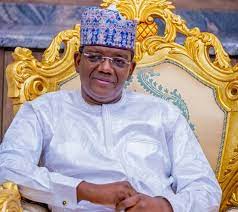By Paul Ejime
Abuja, Oct. 11, 2024 – Nigerian international footballer Nwankwo Kanu is best known for his illustrious exploits in the round-leather game, plying the trade for two decades for club and country, including at top European Leagues scoring 109 career goals in 516 appearances with no single red card (transfermarkt.com).
However, a life-threatening heart disease which required surgery in 1996 revealed the other aspect of Kanu’s life as a philanthropist that is less known to many.
That experience inspired him to set up the Kanu Heart Foundation (KHF) – a charity which supports children and adults with heart-related diseases.
Lanky in stature, the 6.6ft-player affectionately called “Papillo,” started from a humble beginning to Stardom as Africa’s most decorated player, and a member of the British Premiership Arsenal “Invincible” squad of the 2003/2004 Season.
Born in Owerri, Imo State, eastern Nigeria, Kanu began his career at local side Federation Works in 1992 before moving to Iwuanyanwu Nationale FC.
After a notable performance in Nigeria’s victorious U-17 World Championship campaign, he was signed by Dutch giants AFC Ajax in 1993 for an undisclosed fee, scoring 25 goals in 54 appearances.
Kanu, later named African Footballer of the Year in 1996 and 1999, played as a substitute in Ajax’s 1995 UEFA Champions League final 1-0 win over AC Milan of Italy.
A UNICEF Ambassador, also decorated with Nigeria’s National Order of the Niger (OON), Kanu is one of the few Africans, to have won the UEFA Champions League, UEFA Super Cup, Olympic gold medal, FIFA U-17 World Cup medal and several European domestic League titles.
Kanu’s contributions to Nigeria’s victory over Ghana at the 1993 FIFA U-17 World Championship in Japan, were only matched by his crucial goal, which secured his country the gold medal at the Atlanta 1996 Olympics.
His prowess shone at Ajax, Inter Milan and English clubs – Arsenal, West Bromwich Albion, and Portsmouth.
“Opposition players would struggle to deal with Kanu not just because of his undeniable talent and technique but also because he was so impossible to predict that it often felt as if even, he didn’t know what he would do next,” football analyst Adam Durack wrote in 2016.
Like every amazing story, Kanu’s was not without its flip side. His transfer from Ajax to Inter Milan in 1996 was a turning point.
Earlier that summer, Kanu had captained the Nigeria national team that won gold at the Olympics, where he scored two late goals in the semi-finals against football powerhouse Brazil to overturn a 2-3 scoreline into a 4-3 win in extra time.
He was named African Footballer of that year, but then came what seemed like an anti-climax to a glorious career.
After he returned from the Olympics, Kanu underwent a medical examination at Inter, which revealed a serious heart defect and many thought it was the end for the Nigerian player.
Only a few including Kanu himself, entertained any hopes in what was considered a “50-50 chance” surgery in the U.S. in November 1996 to replace an aortic valve.
Luckily, the medical procedure was successful, enabling Kanu to resume his career in April 1997.
In interviews, Kanu frequently cites his faith as a Christian and often mentions this trying time of his career as an occasion, when he prayed to God.
Necessity, they say, is the mother of invention. In 2000, the Nigerian footballer set up the KHF, which helps predominantly underprivileged young African children who suffer from heart defects. In 2008, the KHF expanded its work, to include aid to homeless children.
Just like the 1996 surgery turned Kanu’s football career around for good, KHF has transformed the lives of more than 500 children of varying ages, whom the Foundation has supported to get open heart surgery in parts of the world.
Heart disease or cardiovascular disease is a general name for a wide range of diseases, disorders and conditions that affect the heart and blood vessels.
Cardiovascular diseases both in adults and children constitute a major public health problem with the heart’s structure and function due to abnormal heart development before birth.
According to experts, this is the most common type of birth defect and is responsible for more deaths in the first year of life than any other birth defect.
The good news is that some heart diseases that are diagnosed early can be successfully treated before permanent heart damage and complications, such as heart failure and cardiac arrest.
A study conducted at The Department of Paediatrics; Aminu Kano Teaching Hospital (AKTH) found that 81% of children examined over two years had abnormal heartbeats.
Congenital heart disease accounted for 55 (62.5%) of the studied subjects, while acquired heart diseases were responsible for 33 (37.5%) and isolated Ventricular Septal Defect (VSD) was the commonest congenital heart disease.
The study also showed that rheumatic valvular heart diseases were the most common acquired structural heart diseases, with the researchers concluding that “there is an urgent need for the government (and other stakeholders) to establish a well-equipped cardiothoracic surgical Centre to cater for patients, either ‘free or at highly subsidised rates.”
The KHF objectives include providing evidence-based high-quality cardiac disease care from assessment and diagnosis, through a multi-disciplinary approach to treatment, recovery and palliative care, providing prevention services including public education and health promotion campaigns as well as screening services for early diagnosis, and providing psychological care and support for patients and their relatives, especially children.
Other objectives are to collaborate with similar institutions to develop innovative research programmes and a population-based heart disease registry that will establish a link with other heart disease registries nationally.
The Foundation also seeks to contribute to ongoing research and development efforts to provide an educational and training Centre for heart disease services accessible to health professionals, including training for graduate and post-graduate medical staff, post-registration cardiac disease nurses, interested members of the public, partners and other stakeholders, and investment in facilities and modern equipment for prevention and diagnosis of heart diseases.
The KHF’s overarching Mission is to “give every African child with a heart defect a new lease of life, (toward) achieving our set goals, which include, establishing a Cardiac Specialist Hospital in Nigeria; (and) establishing a Cardiovascular Centre in various states of the Federation where people can walk in and be examined …free.”
The goals also include “providing a platform for quick medical attention to many heart patients who are still handicapped financially to get treatment in overseas hospitals or bringing Cardiac Surgeons to carry out heart treatment in Nigeria, contributing to…research, and seminars as well as creating the desired awareness necessary for combating heart-related problems.”
Most KHF-supported open-heart surgeries have taken place in Israel and Britain, but the costs continue to skyrocket, due to increased demands and the scarcity of foreign exchange.
Speaking with this writer, the KHF’s Coordinator, Emma Abia, said the Foundation is overwhelmed with more than 400 patients on the waiting list.
As part of efforts to address the growing demands, he said, the KHF started inviting world-class surgeons to Africa in 2003 to perform heart surgeries on screened patients.
That year, Professor Novick, from the International Children Heart Foundation in Memphis, USA, performed 13 successful operations within 10 days, at the University Teaching Hospital Enugu, eastern Nigeria.
The KHF’s long-term plan to put “back smiles on the faces of children and adults suffering from heart-related problems” is to build and equip a 40-bed Cardiac Specialist Hospital in Nigeria to save more lives.
Nigeria’s federal government has provided the Foundation with a piece of land in Abuja for the facility estimated to cost US$35 million, to be equipped with operating theatres, diagnostic and radiography machines, two Cardiac Cauterization Labs with Heart-lung machines, ICU beds for Post-operative Cardiac surgery patients, Coronary Care Unit beds for Cardiology patients, and step-down beds for patients stable enough to be shifted to ICU/CCU and requiring high-dependency care, among other features.
The major challenge is raising funds for the realisation of this noble project. Kanu has undergone two heart surgeries, and the Foundation is particularly close to his heart, because to him: …one life saved means more than winning trophies. Trophies are good, you work hard for them, …then, you hold them… But life, when it stops, that is the end.”
As a Charity, it is an understatement that the Kanu Heart Foundation requires uninterrupted funding, partnership collaboration and support for its sustainability, to save more lives and contribute to national healthcare and development. (GBN)
Ejime is a Global Affairs Analyst and Consultant on Peace & Security, and Governance Communications.





